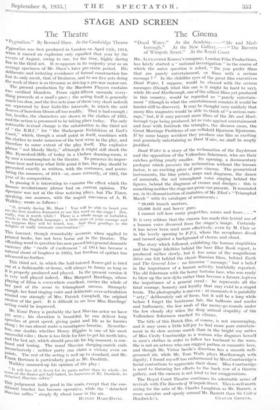STAGE AND SCREEN The Theatre
"Pygmalion." By Bernard Shaw. At the Cambridge Theatre Pygmalion was first produced in London on April 11th, 1914, When it caused an explosion only equalled that year by the events of August, owing to one, for the time, highly daring line in the third act. It re-appears in its majority year as an average pre static period. His ge specimen of Mr. Shaw's later .deliberate and irritating avoidance of formal construction has Jost its only merit, that of freshness, and to see five acts doing Abe work of three is as tiresome as driving a pre-war motor-car.
• The present production by the Macdona. Players contains Awo cardinal blunders. From eight-fifteen onwards every- thing proceeds at a snail's pace ; the acting itself is generally much too slow, and the five acts (one of them very short indeed) are separated by four Gobi-like intervals, in which the arid 'Mowers ,of boredom bloom all too readily. That is bad enough ; but, besides, the characters are shown in the clothes of 1985, • and the action is presumed to be taking place today. The only noticeable textual change is the substitution in the third act of " the B.B.C." for. " the Shakespear. Exhibition at Earl's Court," which, though a small point in itself, combines with the clothes to make nonsense of the best. scene in the play, and therefore to some extent of theplay itself. The explosive ,phrase " not bloody likely," although it might still shock the airs. Eynesford-Hills of today in a Chelsea drawing-room, is by now a commonplace in the theatre. To preserve its impor, Lance here and keep what little point it has, the play should be Presented exactly as written, with the costumes, and postu- lating the• manners; of 1914—or, more correctly, of 1912, the year of its composition. in passing it is interesting to examine the effect which the famous revolutionary phrase had on current opinion. The Spectator Ay plays, but The Times, as not at the time noticing p sneaking, one assumes, with the august suaveness of A. B. Walkley, wrote as follows : " 0, greatly daring Mr. Shaw ! You will bo able to boast you aro the first modern dramatist to use this word on the stage ! But, really, was it worth while ? . There is a whole range of forbidden of your courage and
words in the English language ; a little more we suppose they will be hoard, too. And then goodbye to the delights of really intimate conversation ! "
This forecast, though remarkably 'accurate when applied to printed books, has not been borne out in the theatre. The offending word in question has now passed into general dramatic currency (the " rustle of excitement " of 1914 has become a natural shout of laughter in 1935), but freedom of epithet has advanced no further.
This third act, in which the half-tutored flower-girl is tried Put at. a fashionable at-home, will always be funny so long as properly produced and played. In the .present version it Is very well played indeed. Miss Margaret Rawlings, whose Playing of Eliza is everywhere excellent, carries the whole of her part of the scene to triumphant success. Strangely enough, her loud ringing voice and deliberate over-articulation remind one strongly of Mrs. Patrick Campbell, the original creator of the part. It is difficult to see how Miss Rawlings' acting could be improved. Mr. Esme Percy is probably the best Shavian actor we have yet seen his elocution is beautiful, he can deliver long speeches at great speed, giving point and life as he hurries ,aloa3 ; he can almost make a mouthpiece breathe. Neverthe- 'ess, one doubts whether Henry Higgins is one of his most successful roles ; there is too little for him to get his teeth into, and the last, apt, which should provide his big moment, is con- !used and boring. The usual Shavian slanging-match ends inconclusively : neither party can claim a victory even on points. The rest of the acting is well up to standard, and Mr. 'crank Bertram is particularly good as Mr. Doolittle. Walkley summed-up his opinion of the play : " It will live (if it lives) for its parts rather than its whole---its scene of the flower-girl.half-baked, its humours of Mr. Doolittle, its detached Shavian This judgement holds good in the main, except that the con-. ditional bracket has become operative, while the " detached Shavian sallies" simply fly about loose in the air. 11UVERT HART-DAVIS,.






































 Previous page
Previous page